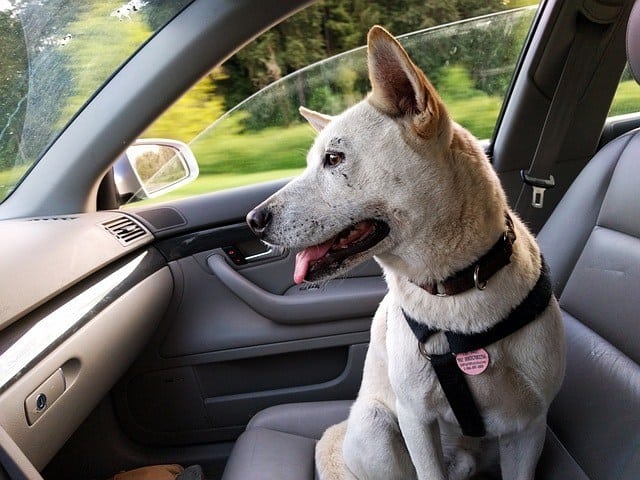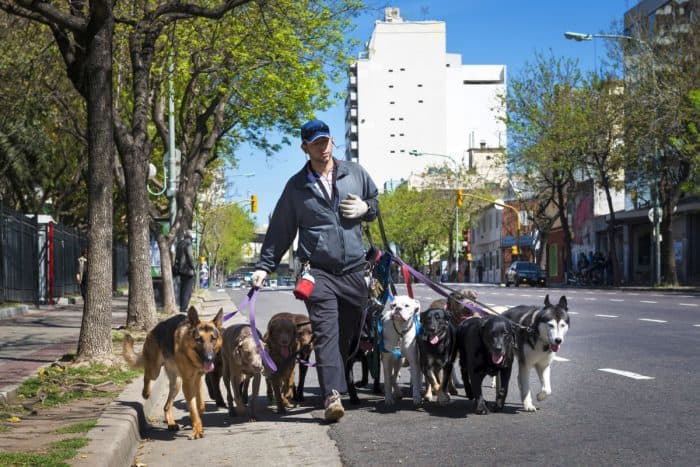There’s a lot to think about when starting your own pet-sitting business.
Fortunately, many of these things are pretty fun to think about. For example, you’ll have to figure out a way to advertise your services, you’ll need to decide how you want your website to look, and you even need to come up with a snappy name for your business.
But there are also a number of things you’ll have to figure out that are less fun.
You’ll likely need to obtain a business license, you may have to set up a post office box, and you may even need to sign up for an insurance policy.
This final consideration is one that causes a lot of confusion among would-be pet sitters, so we’ll try to help you decide whether you need insurance for your new business below.
Do Pet Sitters Need Insurance? General Advice: Yes, Probably
Insurance policies are generally a good idea for most businesses, but they are especially wise for those who engage in high-risk or high-stakes activities.
Pet sitters clearly meet the second criteria, as they’re responsible for the pets – and in many cases the homes – of their clients.
Insurance will not only protect you from financial loses if something bad happens, but it’ll also allow you to stop worrying about avoiding problems and focus instead on doing the best job you can.
After all, you probably got into this business because you like caring for pets, not because you want to worry about things like financial liability.

What is Pet Sitter Insurance + Why Would a Pet Sitter Need Insurance?
There are two primary reasons that most pet sitters should obtain an insurance policy before starting a business. We’ll talk about each of these reasons below.
Insurance Policies Reduce Your Financial Exposure
A number of things can go wrong when you’re taking care of a client’s pets.
For example:
- The pet could escape.
- The pet could bite someone (or another dog) while under your supervision.
- The pet could become injured.
- The pet might break something in the owner’s home.
- You may even damage the client’s home or property accidentally.
If any of these things happen, you may find yourself on the receiving end of a court summons. And, if you don’t have an insurance policy or a substantial bank account to pay for the damages, you may ultimately be forced to go out of business because of the lawsuit.
You may even be held personally responsible – meaning that you’ll still be expected to pay the damages, even after you dissolve the business.
Most good insurance policies cover these types of accidents. Instead of you having to reach into your pocket to pay for the damages, the insurance company will. Some insurance policies will even provide an attorney to plead your case in court.
Insurance Policies Will Help You Land More Clients
If you’ve been in business for any length of time or if you’ve performed any research about the pet-care industry, you already know that pet sitting is a very competitive and crowded field.
Pet owners can choose from dozens – and, in some cases, hundreds – of pet sitters in major metropolitan areas.
So, you’ll need to do everything you can to give yourself a competitive advantage. It’s the only way you’ll have a chance of succeeding in such a crowded industry. Being insured is a great way to do so.
The more gigs you get, thanks – in part – to having insurance, the more money you make in the long run!

You’ll surely notice that most of the successful pet sitters are insured (they’ll usually advertise that they are), and potential clients will usually prefer pet sitters who have policies in place.
Insurance policies not only provide potential clients with more peace of mind, but they also help you project a professional appearance.
What Kind of Insurance Do Pet Sitters Need?
There are a number of different types of insurance policies, and you’ll need to familiarize yourself with the options available.
Different businesses use slightly different terms to describe their policies, but the basic options are as follows:
Liability Insurance
Liability insurance policies protect your business from things like property damage or bodily injury that may occur during the course of doing business.
Liability insurance policies are typically comprehensive, but they may not cover some loses. You’ll just have to review the policy carefully to determine what is and is not covered.
Liability insurance is the first type of insurance policy most dog sitters – particularly those with new businesses – should obtain.

Worker’s Compensation Insurance
Worker’s compensation insurance (often simply called “worker’s comp”) is an insurance policy that covers the costs employees may incur if they become injured while on the job. It may also pay a portion of their salary until they are able to return to work.
You may not need worker’s compensation insurance if you don’t have any employees, but it is essential if you do. You may even be legally required to obtain worker’s comp, depending on your location and the nature of your business.

Auto Insurance
Auto insurance will protect you (and potentially your employees) from any damages that arise during the business use of a vehicle. In some cases, your personal auto insurance policy may suffice, but some insurance companies will deny claims that occur if you are using your vehicle for business purposes.
Similarly, some policies won’t cover damages that occur while you have live animals in the vehicle.

Given the risks driving always presents, this is an important consideration for dog sitters and walkers – particularly those who employ others.
Umbrella Insurance
Umbrella insurance policies help to protect you from any gaps in your coverage.
Umbrella policies are most commonly obtained by businesses with a lot of assets to protect, but they can also be wise for startups who engage in high-risk industries.
How Do I Obtain a Pet Sitting Insurance Policy?
Understanding that you need an insurance policy and knowing how to obtain one are two completely different things. Many first-time business owners don’t know where to begin.
We’ll try to help you navigate the process – just follow the steps outlined below.
→ Review the information available from your state’s insurance commissioner.
An insurance commissioner helps to establish and enforce the insurance requirements in their state.
Most will likely provide informational websites that’ll explain the basic insurance requirements in the state, and they may even provide tips and other resources that’ll help you obtain the right type of coverage.
→ Search for companies that insure pet sitters.
A number of insurance companies provide coverage for pet sitters, so this isn’t terribly difficult. In fact, you should probably start with any insurance companies you already have a policy with (such as your car, homeowner’s, or rental insurance provider).
If you can’t find one in your area or don’t already have a relationship with an insurance provider, you may want to consider reaching out to one of the following three business. Each one offers insurance policies for pet-related businesses.
- Business Insurers of the Carolinas (especially popular with dog training business insurance and recommended personally by some members of our staff)
- Pet Sitters Associates
- Kennel Pro
- Pet Care Insurance
→ Obtain quotes from a few different insurers.
Different companies charge different rates and design their policies in different ways. Most will gladly provide you with a quote for free, and some will even allow you to obtain quotes directly from their website.
Once you’ve obtained a few quotes, it is time to compare the options available!
When comparing quotes from different providers, be sure that you are making apples-to-apples comparisons. Don’t just compare the differences in monthly premiums.
For example, one policy may feature cheaper premiums than all of the others, but it may require you to pay a higher deductible when submitting a claim.

→ Speak with an insurance agent or attorney if you have any questions.
If you aren’t completely clear on any details of a policy, make sure you ask questions until you understand the policy completely.
You don’t want to pay premiums for years only to find that the insurance policy you obtained won’t protect you from some types of claims.
It may even be wise to cough up a couple of hundred dollars to speak with an attorney about your potential liability before securing a specific policy. You may be on a shoestring budget at the outset, but you’ll be glad to know you are completely covered once you start rolling in money.
→ Choose a policy and pay your first premium.
Once you’ve figured out the best policy for your needs and spoken with any insurance or legal professionals you need to, it is time to pick out a policy and put pen to paper.
Just note that most insurance policies will not become active until you pay your first premium, so write a check and get it in the mail (or pay via the website, if possible).
How Much Does Pet Sitter Insurance Cost?
Insurance policies for pet sitters vary considerably, and the only way to know exactly how much you’ll have to pay in monthly premiums is to start obtaining quotes.
Some of the factors that’ll influence the amount of money you pay for your policy include:
- Your geographic area
- The number of clients you service
- The length of time you’ve been in business
- The breeds you care for
- The nature of the services you provide (at your own home, at the client’s home, etc.)
- Your projected yearly earnings
A few of the companies offering policies for pet sitters start at around $10 a month or so, but you may end up spending much more than this if you, for example, work with a large number of families.
Others have policies that start at around $40 a month.
You’ll simply have to contact a few insurance companies to find a more detailed answer.
Does Location Matter? What If I Pet Sit at My Own Home vs an Owner’s Home?
In some cases, the location in which you conduct business will affect your liability.
This means that you may need more or less coverage, depending on whether you pet sit at your clients’ homes or your home.
Your typical pet-sitting procedures may also influence your insurance needs. For example, will you be walking the pets at a local park or in your backyard?

You’ll need to carefully research the laws in your state and any current insurance policies you have to determine how location will affect your insurance needs. As when picking a good policy, your state’s insurance commissioner may be able to provide information, and you can always speak with an insurance agent or attorney.
However, we do want to correct one common misconception new pet sitters often have: Caring for pets in your own home does not eliminate your liability. In fact, it may even increase it in some cases.
It is true that you won’t have to worry about being sued because you broke a window or TV in your client’s home while caring for his or her pet. If you break something in your own home, you’ll just have to pay to get it fixed – just like you would if you broke something while playing with your own dog.
But you may find yourself in hot water if your client’s dog becomes injured while visiting your home. If, for example, your client’s dog breaks a leg because he tripped on a tree stump in your backyard, you may find yourself liable.
Note that your homeowner’s insurance policy may not cover business activities conducted in your home. In a worst-case scenario, your client may place a lien on your home until you’ve paid for any damages that occurred.
Do I Need Pet Sitting Insurance to Use Online Booking Services, Such as Rover?
A lot of pet sitters are using referral services, such as Rover or Wag, to help find and book clients. There are a variety of referral services available, and they all have different policies regarding insurance.
Some will require that sitters obtain a liability insurance policy to use the service, but most do not. Frankly, these services don’t care if you get sued – they’re only interested in limiting their own liability.
Some (including Rover) do provide some insurance coverage to clients who book services through the company, but the nature of the coverage varies wildly from one business to the next. Accordingly, you’ll want to research the terms and conditions before signing up with any of these services.
Even if they don’t require pet sitters and walkers to be insured, it may still be very wise for you to obtain a policy.

What Does it Mean to be Bonded and Insured as a Pet Sitter?
Insurance isn’t the only type of protection pet sitters may want to acquire. You may also want to think about becoming bonded.
Bonding is somewhat like insurance, but it actually protects your clients, rather than you. Bonding will cover any losses experienced by the client in the case that you steal or misplace some of their property.
It is often obtained by pet-sitting businesses who have many contractors or employees, but it can make sense for owner-operators to do so as well.
I know what you’re thinking: I would never steal anything from my clients, so I don’t need to become bonded. However, there are a variety of ways you may accidentally lose or take some of your client’s property and wind up facing a lawsuit.
For example, you may accidentally pick up your client’s phone, thinking it was yours. A few hours later, you accidentally drop the phone, leaving your client with a several hundred dollar loss. A bond would likely pay for the phone in these circumstances.
Also, like insurance, bonding helps to project a professional appearance to potential clients, and it’ll often help you be more competitive in the marketplace.
Do I Need Insurance for Dog Walking?
Dog walkers may provide slightly different services than pet sitters, but they are subject to many of the same risks and liabilities that pet sitters are. Accordingly, it is usually wise for dog walkers – as well as anyone who works in a pet-care field – to obtain a liability policy.
In addition to providing protection against lawsuits, insurance will help dog walkers look more professional compared to the other dog walkers in business in your area.

Learning that you may need to obtain insurance can be a bummer for many people interested in starting a pet-sitting or pet-walking business. Part of the appeal of these types of businesses is that you don’t need a lot of money to start them.
However, you’ll be glad you obtained an insurance policy if something bad ever happens while you’re on the job, as the only difference between a successful business and one that has to close its doors often comes down to insurance.
Do you have a dog-walking or dog-sitting business? Let us know how you’ve navigated the insurance-policy waters below!








1 Comment
June 30, 2019
This was very helpful to me. I am just starting out and was somewhat confused as to the level of insurance and bonding coverage. I will not have any employees however personal thief is a concern as it appears we are in an entitled age and lawsuits a plenty. Just happens I do have an appointment with a business attorney this next week to chat about my liabilities as a pet sitter.
Thank you so much.